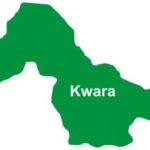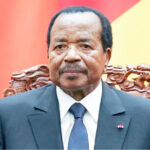Hassana has not been wearing face masks for several weeks except when she goes to buildings where she is mandated to do so. She has also not been observing social distancing at weddings and other large gatherings.
She cannot recall when she last used a hand sanitizer or properly washed her hands. She said she and her family stopped adhering to the protocol over five months ago after the lockdown instituted by the government was lifted.
Asked if she was afraid of the pandemic, she said she was not and that if she gets infected , she would utilise the Madagascar herb. The 45-year-old mother of three is very sure the Madagascar herb comprises lemongrass, neem leaves, and pawpaw leaves. “You just boil the three together and inhale,” she said. She disagrees that the composition was different including containing a plant called Artemesia Annua.
She said there were messages widely and regularly circulated on Whatsapp and other social media showing the three as the composition of Madagascar herb.
“The messages came with pictures of these plants but instead of government to ask people to use them from their backyards, they went to another country to import them so that they can make money.”
When told that even the original Madagascar herb has been proven not to be effective in the country, she said the ‘Nigerian Madagascar herb’ cures COVID-19.
Sadiq Mustapha said he almost lost his wife to chloroquine intake during the pandemic. He and his family had begun self-medication with the drug for prevention. But his wife who also had other illnesses developed on some side effects and had to be taken to the hospital.
Jonah Igbe told Daily Trust that he had never observed the instituted preventive measures for COVID-19; and does not intend to do so even with the warnings of a second wave. He said the COVID-19 pandemic was over-hyped and politicised to get money from international and private donors.
Simeon Anaba , 28, recalls with pain how he was turned back from several hospitals whenever he fell ill during the pandemic. He said many of the doctors were running away from patients because they didn’t have Personal Protective Equipment (PPE).
“During the first three months of the pandemic, some people died as a result of being rejected by hospitals but the one that shocked me was when my family rushed me to the emergency unit of a secondary health facility in Kubwa, Abuja, in August. Nobody attended to me for hours. My family had to take me to a primary healthcare centre in a nearby community where the nurses tried their best even though they had constraints of equipment and experts to do the needed laboratory tests.
“It was that PHC facility that saved my life before I was moved to a private hospital. Our health facilities are still not equipped to help Nigerians when they need them,” he lamented.
Almost nine months, after the onset of the COVID-19 pandemic in the country, Daily Trust findings have revealed that misconceptions and misinformation about COVID-19 remain high among the public.
Infodemics and poor communication strategies by all levels of government have led to poor risk perception, complacency, and poor adherence to COVID-19 protocol.
Many people have remained nonchalant even as government and experts warn of a second wave of the pandemic in the country.
The Minister of Health, Dr Osagie Ehanire has warned that Nigeria may experience a second wave of the COVID-19 outbreak if the public continues with noncompliance to instituted health protocol.
He said the country was still threatened by the COVID-19 pandemic and was mindful that countries it had a high volume of travel and business with were experiencing the second wave of the pandemic.
As of yesterday, Nigeria has recorded 15, 148, confirmed cases of COVID-19 across 35 states and the Federal Capital Territory (FCT). Out of these, 61, 073 persons have been discharged, while 1, 163 deaths recorded.
Health experts said citizen’s participation is key to an effective response. They said there is a need to strengthen the health system and also ensure citizens are well informed and included in the response.
According to them, an approach of inclusion and engagement of citizens including the vulnerable groups, integration of infodemic, and emergency preparedness plan, and alignment of all health policies and lessons were key to an effective response against the COVID-19 pandemic and others.
They said there is a need to improve the level of citizen’s acceptance of government’s COVID-19 interventions in order to ensure positive citizen’s response to curtailing the virus.
Dr Francis Ohanyido, a public health expert, said there was need for improved sensitisation of the populace on COVID-19.He said government should ensure community engagement and include civil society organisations so that more people would be enlightened about the virus.
Dr. Omo Izedomwen, the Coordinator of the Abuja Centre of the National Blood Transfusion Service (NBTS), said the deep mistrust between the government and the people was responsible for the poor attitude of the people to COVID-19 and violation of measures instituted for their protection. He said the media and politicians have major roles to play in convincing Nigerians and bringing them closer to governance. “This will go a long way in changing the attitude of the populace to the public health issue of mis-trust,” he said.
Emergency response and state of facilities
There are still fragmentations in the response between the federal government and the states.
To date, testing is still a challenge in the country, unlike other countries that have done massive testing. Only 705, 809 samples have been tested out of the country’s estimated 200 million population. While the NCDC has tried in expanding the number of testing centres across the country, people still wait weeks on end to get results for COVID-19 test. Sometimes, other people around them would have been infected.
The National Coordinator of the Presidential Taskforce on COVID-19, Dr Sani Aliyu, has said that many states have not done enough testing to enable the country meet its testing targets. He added that only the FCT and Lagos have provided requisite testing samples.
He called on citizens to cooperate with the government to tackle the COVID-19 pandemic.
The country’s health system is also bedeviled with inadequate and dilapidated infrastructure. The US government donated some modern ventilators to the country but a number of doctors don’t know how to use them. Capacity building is currently ongoing for them on how to use the ventilators.
Dr Casmir Ifeanyi, a public health expert and medical laboratory scientist, said the country’s health system and response to COVID-19 would be a lot better if the resources are chanelled to the right places.
He said NCDC by its mandate is not for health service provision but to promote and facilitate compliance with international regulations, adding that in the light of this, monies for health service provision should be ploughed into tertiary health institutions and other health facilities and not to the NCDC.
According to him, to date, many tertiary institutions are in dire need of equipment and requisite infrastructure.
An analysis of the national emergency response capacity by an advocacy tool kit on COVID-19 systems rescue and citizen’s action (CORECA) showed that the three tiers of government face many challenges such as inadequate resources, inadequate early warning and surveillance systems, inadequate transport and communication facilities and inadequate human, technical and material capacities among others.
This accounts for the high rate of infection of COVID-19 and other infectious diseases among Nigeria health workers, as well as doctors absconding from hospitals because of lack of PPE.
Chief Executive Officer of the Institute of Human Virology, Nigeria (IHVN) institute, Dr. Patrick Dakum said , “In Nigeria, other health issues, interventions and programs were deprioritized including routine services like immunization, cancer screening exercises, etc as the pandemic persisted. The pandemic exacerbated the health care challenges plaguing Nigeria’s already frail health system. Health care workers were reassigned to provide front line care, further putting pressure on the struggling workforce.”
He called for improved emergency preparedness strategies to handle pandemics that may arise.
As part of efforts towards changing the narrative, some organisations under the umbrella of the Health Sector Response Coalition (HRSC) and with support from the MacArthur Foundation have developed an advocacy tool kit to provide guidance for developing advocacy messages and materials using available evidence on the COVID-19 pandemic and its impact on the citizens.
Speaking during the dissemination of the advocacy tool kit, the executive director of the International Society of Media in Public Health (ISMPH), Moji Makanjuola, said every activity of man is premised on good health, and that everyone must be aligned, included , and all-action fronts must be integrated to leave no one behind.
She said the Emergency Response Tool kit is a useful advocacy tool for government and citizens to ensure efficient healthcare service delivery not just for COVID-19 emergency response but others.
Executive Director of the National Primary Healthcare Development Agency (NPHCDA), Dr Faisal Shuaib, said strengthening our health system is critical and a collective responsibility. He said it the kit was a timely tool towards management and control of COVID-19.
Prof Oyewale Tomori, a renowned virologist, said Nigeria needs to improve efforts in disease control and emergency preparedness. He said it was time the country stopped neglecting what it is supposed to do, and running from pillar to post, begging for aid when emergencies happen.

 Join Daily Trust WhatsApp Community For Quick Access To News and Happenings Around You.
Join Daily Trust WhatsApp Community For Quick Access To News and Happenings Around You.


